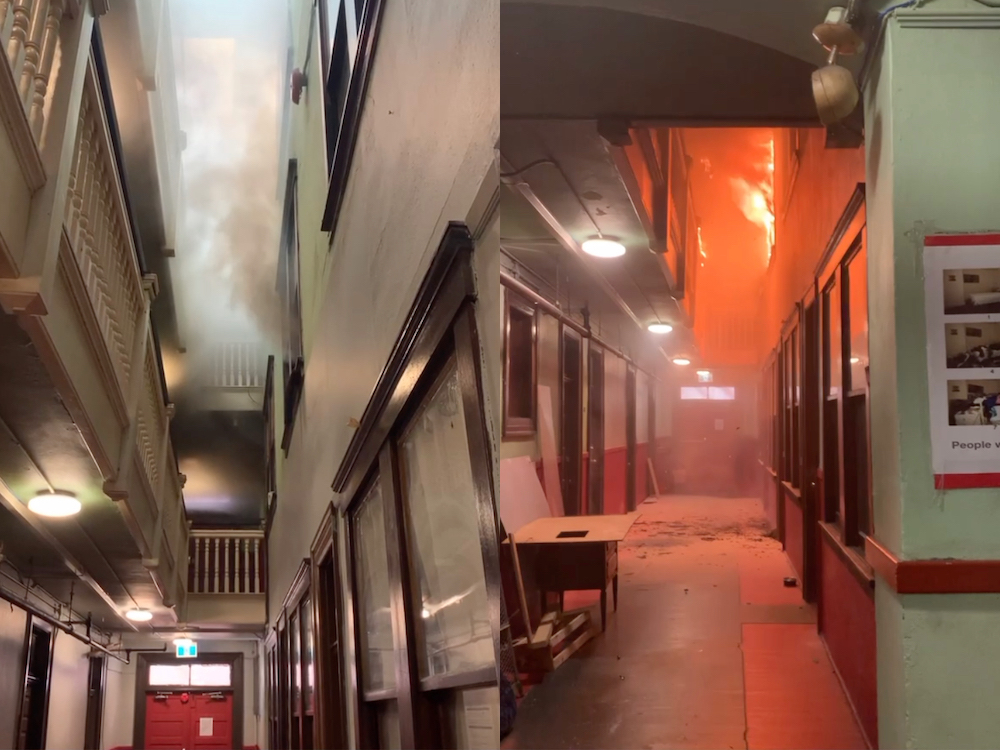[Editor’s note: This story includes video showing the interior of the Winters Hotel during the April 11, 2022, fire that killed two people. Viewer discretion is advised.]
Video from inside the Winters Hotel at the time of a fatal fire shows how quickly the blaze spread and progressed from smoke to flames to falling, fiery debris.
The clips were played as part of a coroner’s inquest Friday. One clip, filmed by Jesse Smith, an employee of Atira, the non-profit housing operator that ran the building as supportive housing for low-income people, showed the building’s alarm finally sounding after its upper floors were engulfed in flames.
Two tenants died in the fire: 53-year-old Dennis Guay and 68-year-old Mary Ann Garlow. Although Guay was hard of hearing, he had never been equipped with an adaptive alarm, such as flashing lights, to alert him in case of fire.
Vancouver Fire Rescue Services said previously that the building’s alarm hadn’t been working since a smaller fire took place three days earlier.
The fire service had ordered Atira staff to immediately fix the alarm and sprinkler systems, which had to be reset after the earlier fire.
But Gina Vanemberg, the building manager of the Winters, told the inquest she waited three days to call a fire services company to reset those systems.
Vancouver Fire Rescue Services deputy chief Rob Renning testified Monday that the alarm system may have finally activated when a resident or staff in the building manually pulled a call-station lever.
The video Smith provided to the inquest shows the rapid progression of the fire, from plumes of smoke to flames, in just four minutes.
According to time-stamps on Smith’s two short videos, the first clip was filmed at 10:57 a.m., while the next was filmed at 11:01 a.m. on April 11, 2022.
Security camera footage from inside the building shows staff and tenants attempting to fight the fire, even as flaming debris was falling through the building’s wide stairwell and atrium. Although many of the building’s fire extinguishers were empty from fighting the April 8 fire, the video shows a tenant appearing to deploy a working extinguisher on some of the flames.
The Tyee applied to the inquest and got permission to show the videos.
On Friday and Monday, the inquest heard from two Vancouver firefighters that the Winters Hotel was extremely susceptible to fire because it was a century-old structure that was not fitted with modern building materials that would have slowed the spread of the fire and prevented it from leaping from room to room.
Renning and Jason La Greca, a former investigator for the fire service, both testified that the building’s unusual design — with its large open stairwell running from the second to fourth floors as well as its open atrium — would have also contributed to the fire’s rapid spread. Other elements, like an unused elevator shaft, would also have provided open space for the fire to spread and grow.
Fire service Capt. Cliff Lee testified that members of the fire department’s urban compliance team had repeatedly cited the building in 2020 and 2021 for not having its building alarm serviced. For over a year — from June 2020 to September 2021 — firefighters consistently found that the service tag indicated the system had failed and needed servicing.
“That doesn’t mean the alarm would have failed,” Lee said, but it did show that the alarm needed to be rechecked to make sure it was working properly.
Asking why it was taking so long, firefighters were told it was because the fire services company needed access to the commercial units on the ground floor. Lee said firefighters took it upon themselves to knock on every store door and let the business owners know a service technician needed access.
Vancouver Fire Rescue Services records show the alarm was serviced properly in the fall of 2021.
Lee was also asked about a meeting he attended with Atira managers Grant Barton and Chauncey Carr on April 5, 2022, just six days before the fire. Lee said the meeting was called because properties operated by Atira Property Management had been having a high number of fires and false alarms.
Rytch Newmiller, manager of accessible communication services with a company called Wavefront, also testified about adaptive alarms that can be installed for hearing-impaired people.
Newmiller told the inquest that adaptive devices, such as strobe lights, cost between $200 and $500 to install, but that every deaf and hard-of-hearing person should have a personalized plan for the adaptive device that would work best for them.
Previously, Vanemberg testified that while she initially asked BC Housing for an adaptive alarm for Guay when he moved in, she never heard back. John Claxton, the front desk staffer on duty at the time of the fire, testified that while he was aware Guay was deaf, there was no plan for how staff would alert Guay in case of fire.
Renning and Lee also highlighted how unsuitable single-room occupancy hotels are for housing high-needs people with mental health and addiction issues.
It’s a terrible combination, Renning said, because residents frequently accidentally start fires in the old hotels, which are not built to modern fire codes. ![]()
Read more: Rights + Justice, Housing

















Tyee Commenting Guidelines
Comments that violate guidelines risk being deleted, and violations may result in a temporary or permanent user ban. Maintain the spirit of good conversation to stay in the discussion and be patient with moderators. Comments are reviewed regularly but not in real time.
Do:
Do not: